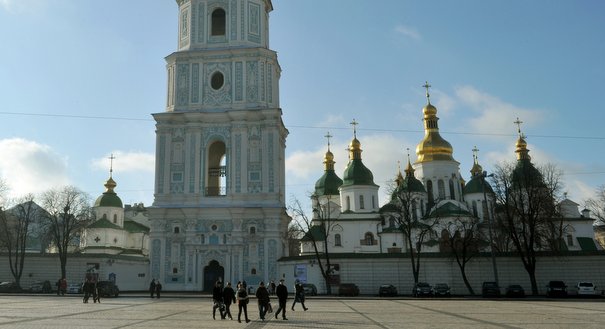While analysts are trying to predict whether Ukraine will go East or West, the country is standing still. The Ukrainians do not really want to choose. They sit comfortably in between, and as long as they have their piece of land and more or less friendly relations with their neighbors, they will not move a finger as in the old times. Opinion polls do not help much either—there is an almost equal percentage of people who support the alignment with the EU and with Moscow. Different cultures, languages, and religions—all of that can comfortably coexist in modern Ukraine.
Yet the country is pushed to choose—by the East and the West themselves. Each of them puts an offer on the table. The EU offers real economic and political integration through painful reform without a membership perspective in the end, while Russia suggests a membership in the Eurasian Customs Union and allegedly cheaper gas without much need for real integration. These two offers are like apples and oranges, but many Ukraine observers on both sides like to compare and contrast them to underline the dramatic nature of the country’s choice.
Yesterday, Moscow made Ukraine’s choice easier by starting yet another trade war. This time a big one. It is not only about Ukrainian chocolate anymore. All Ukrainian goods imported to the Russian Federation were put on the list of potentially dangerous by the Russian Customs Service according to Interfax-Ukraine. Allegedly, the decision had been made earlier—prior to President Putin’s visit to Ukraine in July this year—and introduced only now. Ukrainian goods are still allowed to enter the territory of the Eurasian Customs Union, yet their checks are made more lengthy and complicated. The estimated losses that will hit almost all major Ukrainian oligarchs and the state budget may reach $2-2.5 billion in the second half of 2013. For a country heavily dependent on its exports, this can be a big problem.
Moscow knows that. The current trade war is clearly about the East-West choice. This is Putin’s way of convincing a partner to choose him and join the Eurasian Customs Union. It remains to be seen how long the trade war will last and what the response of the Ukrainian side will be. Will Yanukovych get scared of the short-term economic losses and run toward the Customs Union? Or will he go through the storm keeping head up high and force Russia (which will also be an economic loser in this war) to back off? Or will this trade war scare Yanukovych and Ukrainian oligarchs and push them to seek protection in the EU through meeting all conditions and signing the Association Agreement? These are all open questions.
However, one thing is clear—Putin needs a new PR agency for his relations with the neighbors. The one that would remind him of Russia’s losses during the Orange revolution in Ukraine. The one that would bring to his attention how public opinion in Ukraine—regardless of political views—swings toward support of the country’s leadership once Ukraine is confronted by Russia. The one that would advise him to sit and wait patiently for the Ukrainian leadership to mess up its own country, alienate the West completely, and come to Moscow for the money for the 2015 elections on its knees. Whatever the length and the outcome of the trade war, this time Putin lost Ukraine.
